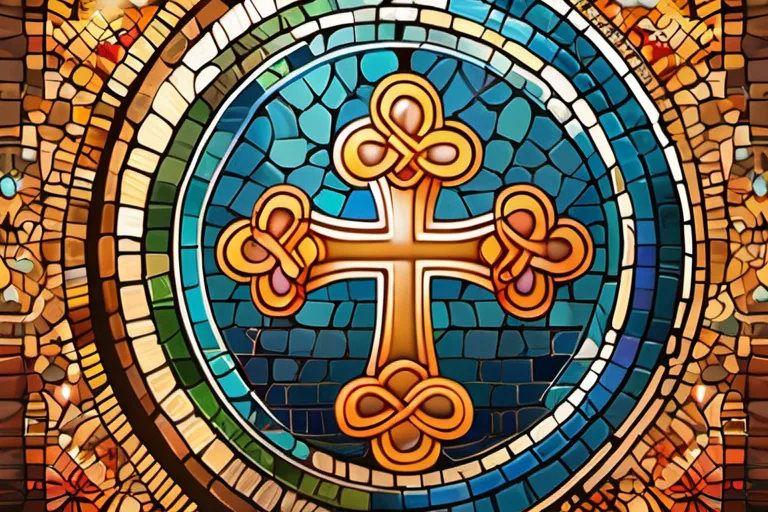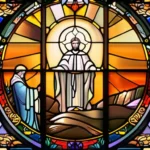Exploring the foundational impact of early Christianity on religious thought and its lasting legacy.
Early Christianity, as a monotheistic religion that emerged in the first century AD, played a pivotal role in shaping religious thought. This article delves into the key aspects of early Christianity’s influence on religious thought, providing insights into its historical context and enduring impact.
The Emergence of Early Christianity
Imagine stepping back in time to the bustling streets of Jerusalem, where the whispers of New Testament ideas were beginning to echo amidst the vibrant traditions of Judaism. How did this nascent movement, born from the teachings of Jesus and his disciples, manage to carve out a unique path that would eventually shape religious thought for centuries to come?
The roots of early Christianity lay deeply embedded in the soil of Judaism. It was within the context of Jewish law, prophets, and messianic hopes that Jesus preached his message. But what set him apart? Was it his claim to be the long-awaited Messiah, or perhaps his revolutionary teachings on love, forgiveness, and inclusivity? The question remains: how did these ideas resonate with a diverse group of followers who eventually transformed them into the foundation of a new religious identity?
Key figures such as Peter, Paul, and James played pivotal roles in shaping early Christianity. Peter, with his unwavering faith and leadership, became one of the earliest apostles. Paul, through his extensive travels and powerful sermons, spread the gospel far beyond Jerusalem’s borders. And James, as Jesus’ brother, provided a bridge between Jewish and Gentile Christians. How did these individuals navigate the complexities of reconciling their new faith with traditional practices?
The emergence of early Christianity was not just about beliefs; it was also about community formation. These early believers faced persecution, yet they united under shared rituals and teachings. The Eucharist, or Communion, became a central practice, symbolizing the body and blood of Christ for those who gathered in His name. Baptism too marked initiation into this new faith, washing away old sins and welcoming fresh beginnings.
How did these practices evolve over time? Did they remain as simple, heartfelt acts or did they become more ritualistic and complex? The answers to these questions lie within the intricate tapestry of early Christian history, a story that continues to unfold even today, influencing religious thought in profound ways.
As we delve deeper into the beliefs and practices of early Christianity, it is crucial to remember that this journey was both challenging and transformative. It was through trials and triumphs that the seeds of what would become one of the world’s largest religions were planted. The influence of these early days on religious thought cannot be overstated.
Beliefs and Practices of Early Christianity
The beliefs and practices of early Christianity were like the roots of a mighty tree, deeply embedded in the soil of history and reaching towards the heavens. The Trinity, for instance, was not just a theological concept but a foundational belief that reshaped how people understood their relationship with God. How can one reconcile three persons in one divine essence? It’s a question that still puzzles many minds today, yet it became central to Christian doctrine.
The sacraments, too, were integral to early Christianity. Baptism and the Eucharist were not just rituals but powerful symbols of spiritual transformation and communion with Christ. How can water and bread and wine be so transformative? They represented more than mere symbols—they were channels through which God’s grace flowed. Wasn’t it a profound experience for those first believers, to see their faith brought to life in such tangible forms?
The role of the Bible was another cornerstone. The scriptures, both Old and New Testaments, became the bedrock upon which Christian teachings were built. How did early Christians interpret these texts? Were they read as historical accounts or as divine revelations? The answer lay in a blend of both, weaving a tapestry of faith that connected the past with the present.
The Bible was not just a collection of stories; it was a guide for living. Early Christians found answers to their questions within its pages, from the life and teachings of Jesus to the letters of Paul. How did these writings shape their daily lives? They became the basis for moral conduct, community norms, and spiritual guidance.
In many ways, early Christianity’s beliefs and practices were like a bridge between old and new worlds. Judaism provided the roots, but it was in Christian beliefs that a new worldview emerged—one that emphasized forgiveness, love, and the promise of eternal life. How did this transformation impact society? It laid the groundwork for a faith that would continue to evolve, influencing not only religious thought but also shaping the course of history.
Early Christianity’s Impact on Society
Imagine for a moment, stepping back into the bustling streets of ancient Rome. Can you see the grandeur and complexity of the Roman Empire, with its diverse religious landscape? How did this vast, multifaceted world manage to incorporate something as revolutionary as early Christianity? The answer lies in the profound influence that early Christianity had on society, touching not just religion but art, literature, and philosophy as well.
Consider how Christianity fundamentally altered the Roman Empire. Early Christians saw themselves as a community of believers, united by their faith rather than bound by citizenship or ethnicity. This idea was revolutionary in an era where loyalty to one’s city-state or province often dictated social standing and political allegiance. By emphasizing equality before God, early Christians challenged the hierarchical structures that defined Roman society.
Artistic expression also bore the mark of early Christianity. Think about the catacombs beneath Rome—those dark galleries adorned with frescoes depicting scenes from the New Testament. These works were not just art; they were a form of community and faith building, preserving stories that might otherwise have been lost to history. The use of symbolism in Christian iconography also became a powerful tool for spreading the gospel, making it relatable and accessible to a wider audience.
Moreover, early Christianity’s influence on literature is undeniable. Think about the works of Tertullian or Lactantius, who used rhetoric to defend their faith against critics. Their writings helped solidify Christian doctrine and provide theological frameworks that would shape future thinkers. The emphasis on scripture also led to an increased scholarly interest in texts and language, which in turn influenced the development of academic disciplines like theology.
And let’s not overlook how early Christianity impacted philosophy. Think about the paradoxes faced by early Christians—how could a loving God allow suffering? These questions pushed thinkers to reconsider their philosophical frameworks, leading to new schools of thought that blended Christian teachings with classical wisdom. The Church Fathers, such as Augustine, used Platonic and Aristotelian ideas to articulate Christian doctrine in ways that resonated with the intellectual elite.
In essence, early Christianity didn’t just challenge the status quo; it transformed it. By redefining concepts of community, artistry, literature, and philosophy, early Christians laid the groundwork for a new understanding of human society and its place within the cosmos. Their influence continues to be felt in every corner of religious thought today.
The Spread of Early Christianity
The spread of early Christianity was like a wildfire, but one that carried the seeds of hope and salvation rather than destruction. It began within the cradle of Judaism in Palestine, but soon burst forth to engulf Rome, its then capital, and beyond. How did this small sect of Jews manage to conquer such vast territories? Was it merely by the sheer force of its beliefs or was there something else at play?
The spread of early Christianity can be traced through a series of strategic steps. First, it moved from Jerusalem across the Mediterranean into Greece and Asia Minor, regions where Greek culture held sway. Here, Christians found fertile ground as they preached their message in familiar languages and using concepts that resonated with Hellenistic philosophy. The idea of a personal savior was akin to the Greek notion of a hero or demi-god, making it easier for Greeks to embrace this new faith.
From there, early Christianity spread into Rome, the heart of the Roman Empire. It met with both tolerance and persecution, depending on who was in power. Yet, its resilience was akin to a vine that clings tightly to any support it finds. The early Christians saw themselves as the chosen ones, destined to carry their message across the world. Their unwavering faith and unity were like the threads of a tapestry, weaving together disparate communities into a cohesive whole.
The influence of early Christianity extended far beyond its geographical boundaries. It seeped into cultures in North Africa, reaching places such as Egypt and Carthage. In these lands, it found new life, adapting to local traditions while maintaining its core beliefs. This adaptability was crucial for the religion’s survival and growth. The metaphor of a river changing course as it flows through different landscapes aptly describes how early Christianity navigated diverse cultural terrains.
But why did other cultures embrace this new belief system? Was it merely because of its novelty, or were there deeper reasons at play? Perhaps the appeal lay in its promise of eternal life and forgiveness. In a world marked by hardship and uncertainty, the Christian message offered solace and hope, much like a lighthouse guiding ships through treacherous waters.
As early Christianity spread, it began to influence not just religious thought but also social structures and governance. Its teachings on compassion, charity, and forgiveness started to shape Roman laws and ethics, creating a moral framework that was both innovative and enduring. This integration of Christian principles into the fabric of society paved the way for its lasting impact.
Through all these expansions, early Christianity remained true to its core beliefs while embracing the diversity of the world around it. Its journey from a small sect to becoming a dominant force in religious thought is nothing short of miraculous. The spread of this religion was not just about conquering new lands but also about sowing the seeds of faith and hope in hearts across continents.
Reflecting on its journey, we can’t help but wonder: What lessons can modern religions learn from the strategic growth and cultural adaptability of early Christianity? As it continues to influence religious thought around the world, its legacy remains a testament to the power of belief and the enduring impact of a message of hope.
Early Christianity’s Legacy in Religious Thought
Early Christianity’s influence on religious thought was like planting a seed that grew into a towering oak, overshadowing and nurturing the surrounding landscape for centuries to come. How could this new religion, born in the bustling markets of Jerusalem, have such profound impacts on subsequent religions and philosophies? The answer lies in its unique blend of monotheism, ethical teachings, and spiritual experiences.
One can scarcely overstate the impact early Christianity had on Judaism. For centuries, Jewish thought was deeply influenced by the belief in one God, a concept that early Christians adapted and expanded upon. Early Christians viewed Jesus as both human and divine, bridging the gap between the physical and spiritual realms—a notion that resonated with Jews seeking deeper spiritual fulfillment.
But it wasn’t just Judaism that felt the ripples of Christian thought. The rise of Christianity also had a significant impact on paganism, which was prevalent throughout the Roman Empire. Many Romans adopted elements of Christian philosophy, such as the idea of a personal God and the concept of salvation, gradually merging these beliefs with their existing polytheistic practices.
The influence of early Christianity extended beyond religious boundaries into philosophical discourse. Philosophers like Origen and Tertullian integrated Christian thought with Greek philosophical traditions, creating new forms of ethical reasoning that emphasized love, forgiveness, and individual moral responsibility. This fusion of ideas laid the groundwork for future developments in Western philosophy.
Moreover, early Christianity’s emphasis on community and social justice played a crucial role in shaping medieval European society. Charlemagne, for instance, was heavily influenced by Christian principles when he established his empire, integrating religious values into governance and education. This legacy of using faith to guide societal norms continues to echo through the ages.
So, as we reflect on early Christianity’s lasting impact, one can’t help but wonder: How would the world be different if this religion had never spread? The threads of Christian thought wove their way into the fabric of Western civilization, influencing everything from art and literature to politics and science. It is a testament to the enduring power of early Christianity that its ideas continue to shape our understanding of the divine and the human experience.
The Relevance of Early Christianity Today
The Relevance of Early Christianity Today: Can we truly understand Western civilization without delving into the roots of early Christian thought? How does this ancient faith shape our modern worldviews and religious practices?
Imagine a vast garden, where each flower represents a different culture or religion. At its heart lies Christianity, with its profound influence spreading out in every direction. The teachings of Jesus Christ and the early Church have not only shaped Western society but continue to resonate in contemporary religious thought.
From moral ethics to social justice, the legacy of early Christianity is evident. How can we ignore the impact of Christianity’s principles on modern human rights and freedoms? The idea that all individuals are created equal, a concept deeply rooted in Christian theology, has transformed our societies from mere collections of people into communities of dignity and respect.
In our fast-paced, often disconnected world, early Christian teachings offer a timeless guidance. How can we find peace amidst chaos if not through the commandments to love one another as Christ loved us? This call to compassion and mercy is more relevant than ever, urging us to see the divine in every person.
The influence of early Christianity extends beyond religious boundaries. It has molded the fabric of Western education, art, and literature. From Dante’s Inferno to Shakespeare’s plays, Christian imagery and themes permeate our cultural expressions. Even secular institutions often reflect the ideals that emerged from early Christian communities.
Reflect on how much we owe to these ancient roots. Are we truly living up to the values of compassion, forgiveness, and love that Christianity promotes? The relevance of early Christianity today lies in its ability to challenge us, to push us towards becoming better versions of ourselves—more just, more compassionate beings.
As we navigate the complexities of modern life, let us not forget the wisdom that has guided humanity for centuries. Early Christianity offers a beacon of light in our often murky existence, reminding us of what it means to be human in the fullest sense.
Conclusion
 By examining the origins, beliefs, and practices of early Christianity, we can better understand its profound influence on religious thought. As a foundational religion that has shaped Western civilization, early Christianity continues to be relevant today.
By examining the origins, beliefs, and practices of early Christianity, we can better understand its profound influence on religious thought. As a foundational religion that has shaped Western civilization, early Christianity continues to be relevant today.











